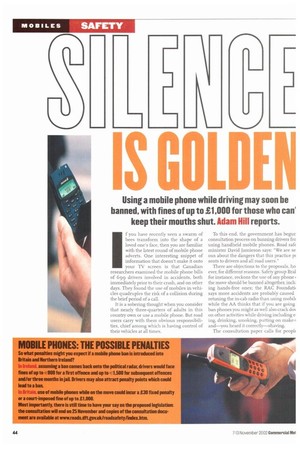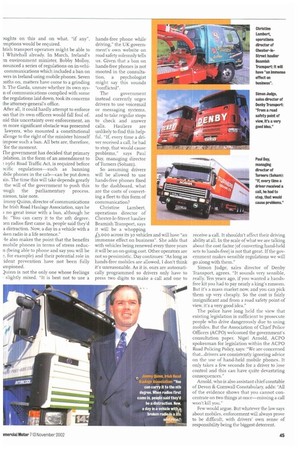Using a mobile phone while driving may soon be banned,
Page 44

Page 45

If you've noticed an error in this article please click here to report it so we can fix it.
with fines of up to £1,000 for those who can keep their mouths shut. Adam Hill reports.
I you have recently seen a swarm of bees transform into the shape of a loved one's face, then you are familiar with the latest round of mobile phone adverts. One interesting snippet of information that doesn't make it onto your TV screen is that Canadian researchers examined the mobile phone bills of 699 drivers involved in accidents, both immediately prior to their crash, and on other days. They found the use of mobiles in vehicles quadruples the risk of a collision during the brief period of a call.
It is a sobering thought when you consider that nearly three-quarters of adults in this country own or use a mobile phone. But road users carry with them obvious responsibilities, chief among which is having control of their vehicles at all times.
To this end, the government has begur consultation process on banning drivers fro using handheld mobile phones. Road safi minister David Jamieson says: "We are se ous about the dangers that this practice pi sents to drivers and all road users."
There are objections to the proposals, ho ever, for different reasons. Safety group Bral for instance, reckons the use of any phone the move should be banned altogether, inch ing hands-free ones; the RAC Foundati( says more accidents are probably caused retuning the in-cab radio than using mobil( while the AA thinks that if you are going ban phones you might as well also crack dm on other activities while driving including e. ing, drinking, smoking, putting on make-, and—you heard it correctly—shaving.
The consultation paper calls for peoplc nights on this and on what, "if any", !mptions would be required.
Irish transport operators might be able to 1 Whitehall already. In March, Ireland's m environment minister, Bobby Molloy, nounced a series of regulations on in-vehicommunications which included a ban on vers in Ireland using mobile phones. Seven mths on, matters have come to a grinding It. The Garda, unsure whether its own sys n of communications complied with some the regulations laid down, took its concerns the attorney-general's office.
After all, it could hardly attempt to enforce Ian that its own officers would fall foul of. nid this uncertainty over enforcement, an in more significant obstacle was presented lawyers, who mounted a constitutional Illerige to the right of the minister himself impose such a ban. All bets are, therefore, for the moment.
[be government has decided that primary islation, in the form of an amendment to 1961 Road Traffic Act, is required before !cific regulations—such as banning }bile phones in the cab—can be put down tin. The time this will take depends greatly the will of the government to push this :ough the parliamentary process. nieson, take note.
immy Quinn, director of communications he Irish Road Haulage Association, says he 3 no great issue with a ban, although he Is: "You can carry it to the nth degree. len radios first came in, people said they'd a distraction. Now, a day in a vehicle with a ken radio is a life sentence."
-le also makes the point that the benefits mobile phones in terms of stress reducn (being able to phone and say you will be for example) and their potential role in :ident prevention have not been fully tmpioned.
uinn is not the only one whose feelings slightly mixed. "It is best not to use a hands-free phone while driving," the UK government's own webs ite on road safety solemnly tells us. Given that a ban on hands-free phones is not mooted in the consultation, a psychologist might say this sounds "conflicted".
The government instead currently urges drivers to use voicemail or messaging systems. and to take regular stops to check and answer calls. Hauliers are unlikely to find this helpful. "If, every time a driver received a call, he had to stop, that would cause problems," says Paul Day, managing director of Turners (Soham).
So assuming drivers will be allowed to use hands-free phones fixed to the dashboard, what are the costs of converting a fleet to this form of communication?
Christine Lambert, operations director of Chester-le-Street haulier Beamish Transport, says it will be a whopping £3,000 across its 30 vehicles and will have "an immense effect on business". She adds that with vehicles being renewed every three years it will be an on-going cost. Other operators are not so pessimistic. Day continues: "As long as hands-free mobiles are allowed, I don't think it's unreasonable. As it is, ours are automatically programmed so drivers only have to press two digits to make a call and one to
receive a call. It shouldn't affect their driving ability at all. In the scale of what we are talking about the cost factor [of converting hand-held sets to hands-free] is not that great. If the government makes sensible regulations we will go along with them."
Simon Judge, sales director of Denby Transport, agrees. "It sounds very sensible, really. Ten years ago, if you wanted a handsfree kit you had to pay nearly a king's ransom. But it's a mass market now, and you can pick them up very cheaply. So the cost is fairly insignificant and from a road safety point of view, it's a very good idea."
The police have long held the view that existing legislation is sufficient to prosecute people who drive dangerously due to using mobiles. But the Association of Chief Police Officers (ACPO) welcomed the government's consultation paper. Nigel Arnold, ACPO spokesman for legislation within the ACPO Road Policing Policy, says: "We are concerned that...drivers are consistently ignoring advice on the use of hand-held mobile phones. It only takes a few seconds for a driver to lose control and this can have quite devastating consequences."
Arnold, who is also assistant chief constable of Devon & Cornwall Constabulary, adds: "All of the evidence shows that you cannot concentrate on two things at once—missing a call won't kill you."
Few would argue. But whatever the law says about mobiles, enforcement will always prove to be difficult, with drivers' own sense of responsibility being the biggest deterrent.




























































































































































